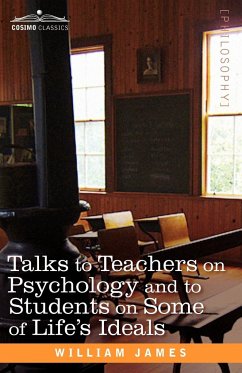
On Some of Life's Ideals
On a Certain Blindness In Human Beings; What Makes A Life Significant
Versandkostenfrei!
Versandfertig in 1-2 Wochen
11,99 €
inkl. MwSt.

PAYBACK Punkte
6 °P sammeln!
2016 Reprint of 1900 Edition. Full facsimile of the original edition, not reproduced with Optical Recognition Software. This book is divided into two sections: "On A Certain Blindness in Human Beings" and "What Makes a Life Significant." The author tries to demonstrate how soaked and shot-through life is with values and meanings which we fail to realize because of our external and insensible point of view. The meanings are there for the others, but they are not there for us. There lies more than a mere interest of curious speculation in understanding this. It has the most tremendous practical ...
2016 Reprint of 1900 Edition. Full facsimile of the original edition, not reproduced with Optical Recognition Software. This book is divided into two sections: "On A Certain Blindness in Human Beings" and "What Makes a Life Significant." The author tries to demonstrate how soaked and shot-through life is with values and meanings which we fail to realize because of our external and insensible point of view. The meanings are there for the others, but they are not there for us. There lies more than a mere interest of curious speculation in understanding this. It has the most tremendous practical importance. It is the basis of all our tolerance, social, religious, and political.









![Inaugural Address: The College, its Ideals and its Problems [by] President John Hanson Thomas Main, PH. D., Iowa College Commencement, Tu Cover Inaugural Address: The College, its Ideals and its Problems [by] President John Hanson Thomas Main, PH. D., Iowa College Commencement, Tu](https://bilder.buecher.de/produkte/71/71705/71705932n.jpg)


